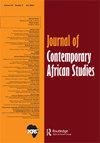George Padmore: Engaged Pan-African Activist and Theorist
IF 0.8
Q2 AREA STUDIES
引用次数: 0
Abstract
This writer is well aware that ideas and tactics have but a brief shelf-life and what would have been relevant for a particular historical period might not be pertinent for the present moment. Notwithstanding this caveat, this paper seeks to examine whether aspects of George Padmore’s political praxis and his theorization on Pan-Africanism are still relevant. The reader is provided with a brief overview of Padmore’s activities and his achievements, to provide the justification for selecting him above other outstanding Pan-Africanists as a role model for young Pan-Africanists. The article assesses the extent to which his political organizational methods still have validity, lessons to be learnt and pitfalls to evade. It also evaluates Padmore’s theorization on African unification in Pan-Africanism or Communism and his efforts to realize this objective; as well as his conception of Pan-African Socialism as the handmaiden for the United States of Africa. Today, the issue of African unification and socialism are still widely discussed across the African continent and within Pan-African circles outside of Africa, therefore Padmore’s thoughts on these matters merits some interrogation.乔治·帕德莫尔:泛非积极分子和理论家
作者很清楚,思想和策略只有短暂的保质期,与特定历史时期相关的东西可能不适用于当前时刻。尽管如此,本文仍试图考察乔治·帕德莫尔的政治实践及其泛非主义理论的各个方面是否仍然相关。读者将对帕德莫尔的活动和成就有一个简要的概述,以便为选择他作为年轻的泛非主义者的榜样而超越其他杰出的泛非主义者提供理由。本文评估了他的政治组织方法在多大程度上仍然有效,值得吸取的教训和避免的陷阱。评价了帕德莫尔在泛非主义或共产主义中关于非洲统一的理论以及他为实现这一目标所做的努力;以及他的泛非社会主义作为非洲合众国的使女的概念。今天,非洲统一和社会主义的问题仍然在非洲大陆和非洲以外的泛非圈内被广泛讨论,因此,帕德莫尔对这些问题的想法值得一些质疑。
本文章由计算机程序翻译,如有差异,请以英文原文为准。
求助全文
约1分钟内获得全文
求助全文
来源期刊

Journal of Contemporary African Studies
AREA STUDIES-
CiteScore
2.20
自引率
0.00%
发文量
18
期刊介绍:
Journal of Contemporary African Studies (JCAS) is an interdisciplinary journal seeking to promote an African-centred scholarly understanding of societies on the continent and their location within the global political economy. Its scope extends across a wide range of social science and humanities disciplines with topics covered including, but not limited to, culture, development, education, environmental questions, gender, government, labour, land, leadership, political economy politics, social movements, sociology of knowledge and welfare. JCAS welcomes contributions reviewing general trends in the academic literature with a specific focus on debates and developments in Africa as part of a broader aim of contributing towards the development of viable communities of African scholarship. The journal publishes original research articles, book reviews, notes from the field, debates, research reports and occasional review essays. It also publishes special issues and welcomes proposals for new topics. JCAS is published four times a year, in January, April, July and October.
 求助内容:
求助内容: 应助结果提醒方式:
应助结果提醒方式:


